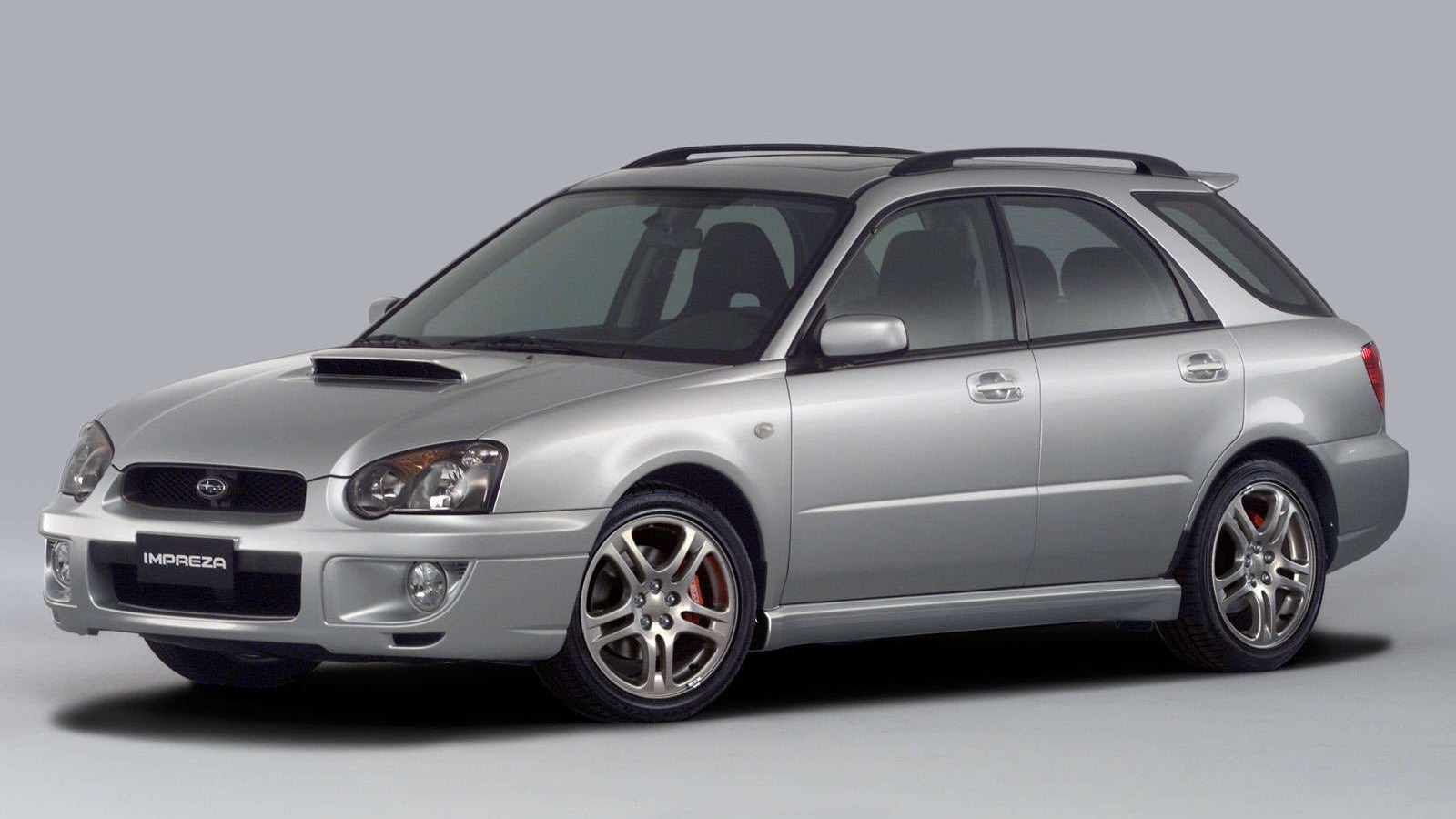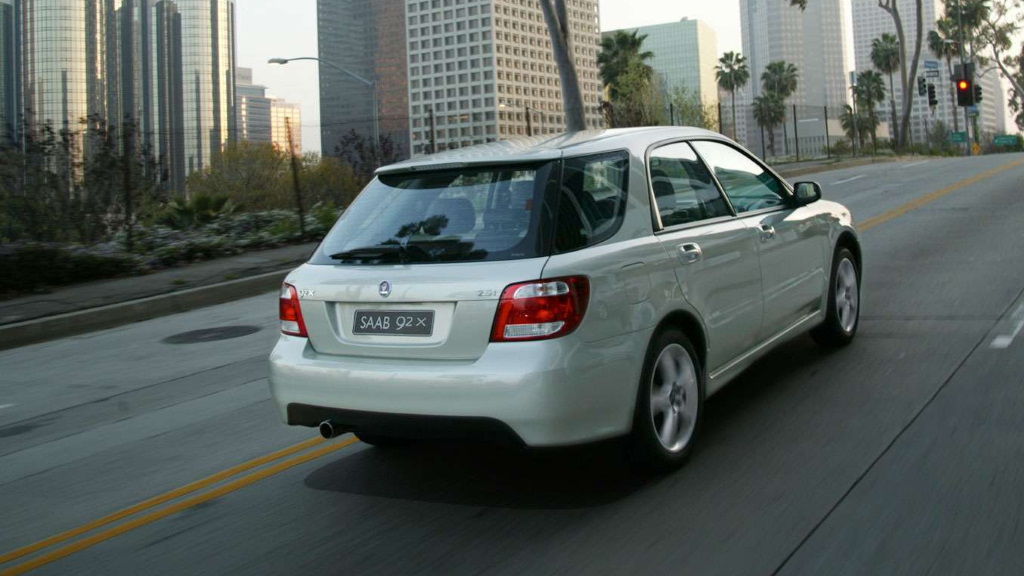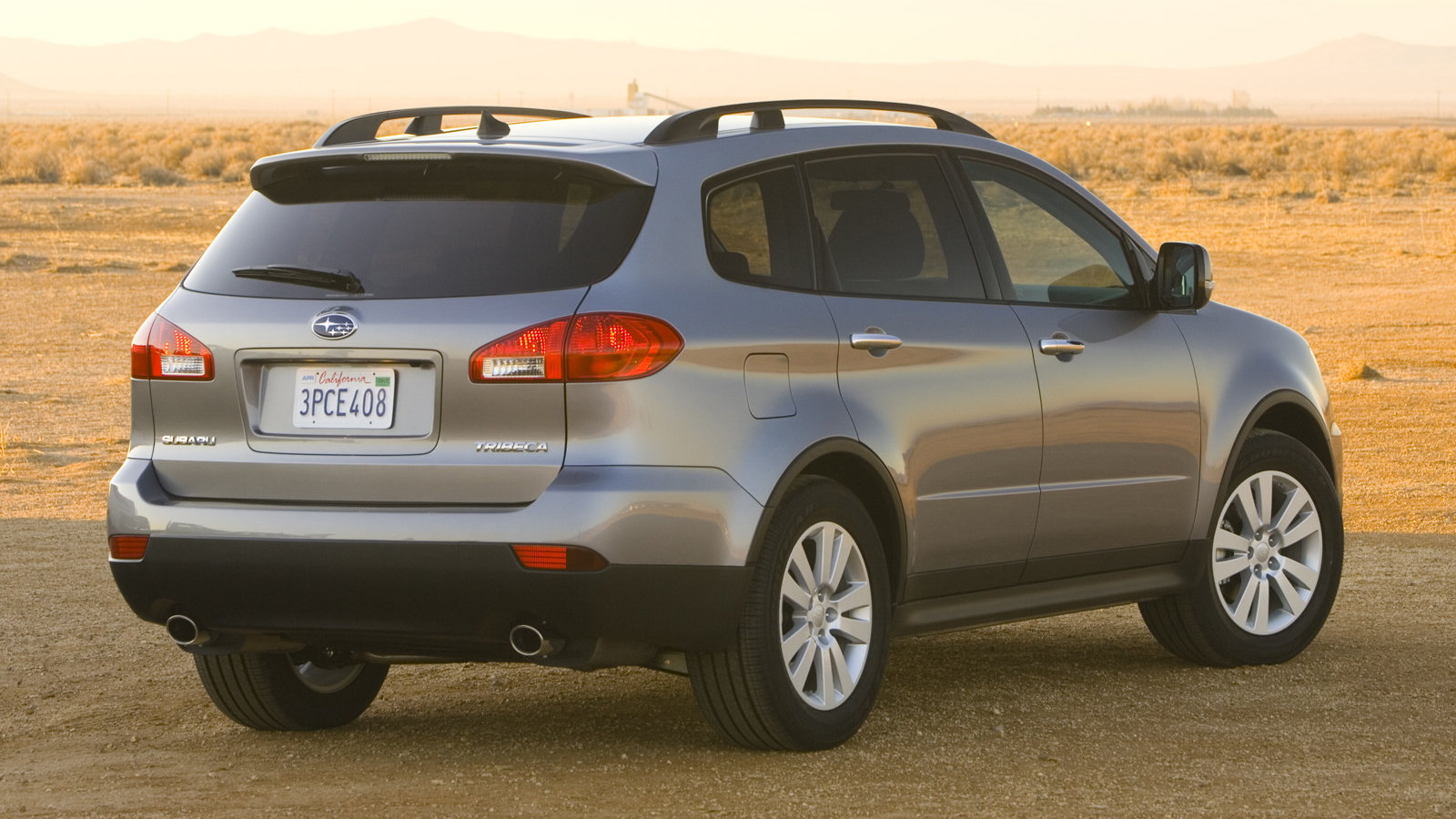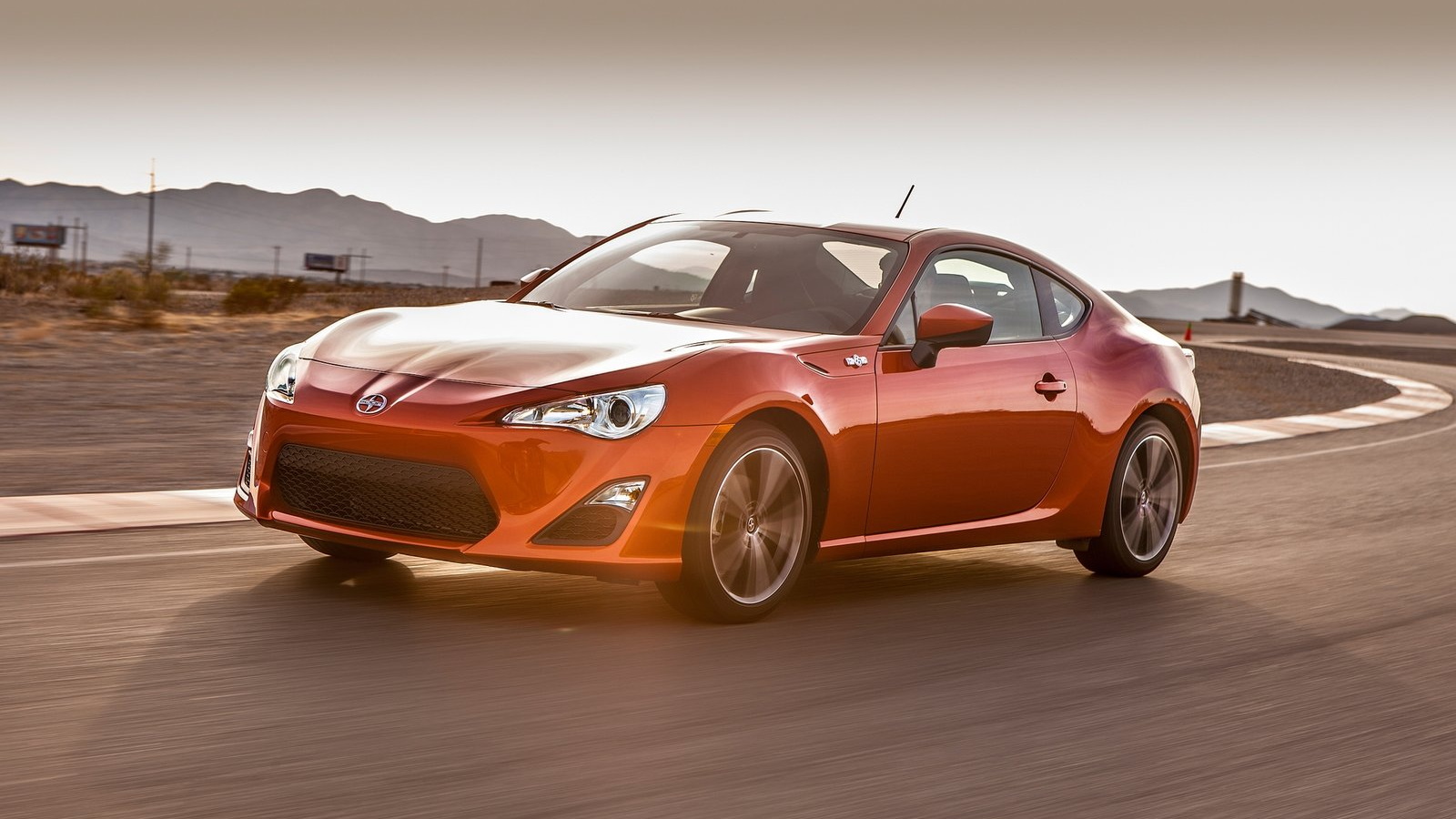General Motors has always been the king of the rebadge. The initial thought process is as simple as it is flawed: Take one car, plaster on several different badges, sell it as several different models under several different brands, and make several times the money. This can work with vehicles that don’t have a ton of character, but what about the weird stuff? Let’s take a closer look at the Saab 9-2X, a neat little wagon made by one of Japan’s weirdest mainstream car brands and sold by one of Sweden’s weirdest car brands. Welcome back to GM Hit or Miss, where we unravel the patchwork quilt of GM’s pre-bankruptcy product planning and separate the high-thread count cotton from the scratchy stuff.
An Unlikely Marriage

Back in 1999, GM bought a 20 percent stake in what was then known as Fuji Heavy Industries, the parent company of Subaru, for the purposes of vehicle collaboration. Straight away, the two firms went to work, and after several years of pondering, created the obvious rebadge you see above – the Chevrolet Forester. It was exactly what it sounded like, a second-generation Subaru Forester with Chevrolet badges, and it was sold exclusively in the Indian market starting in 2004.
The Chevrolet Forester wasn’t the most auspicious start to this partnership, but I reckon that was partly because GM had no idea where Subaru’s vehicles would fit into its lineup. The MBAs eventually remembered they had a branch in Sweden known for hemorrhaging money, yet producing cars with an absolutely rabid fanbase. Just ship the two weirdos together, what could possibly go wrong?
The Swedish Connection

On paper, Subaru and Saab sound like similar carmakers. Fiercely unorthodox, pathological about safety, and with a penchant for turbocharging. Both grew legendary through rallying and both served a well-educated, left-leaning clientele. However, as soon as you hopped behind the wheel of an Impreza, you’d learn that it was nothing like a 9-3 or 900 at all.

The Subaru Impreza wasn’t just unrefined compared to a Saab 9-3, it was unrefined compared to a Mazda 3. Interior materials were rather cheap for such an expensive compact car, road noise was abundant, and the frameless windows sounded great in theory but occasionally produced irksome leaks. For those in northern climes like the Saab stronghold of New England, Subaru rustproofing was more of a suggestion than an actual process, a stark contrast to Swedish seriousness around corrosion-prevention.

In an attempt to prime the Impreza for Saab duties, the engineers had to implement some extensive changes. Let’s start with the most obvious – the insulation package. The 9-2X brought in heavier floor insulation, fender insulation, insulation under the shift boot, and a new headliner backing with better sound-damping properties. The rear quarter trim insulation and tailgate insulation were re-worked, and a new rear engine mount was done up to damp powertrain vibrations.

In addition to the massive selection of NVH-quelling measures, the Saab 9-2X also got heaps of chassis parts to ensure it drove better than an Impreza. Brand new dampers and springs altered ride quality, while stiffer anti-roll bar bushings, shorter rear bump stops, and aluminum forward rear lateral links were all tiny changes that noticeably affected how the car drove. In addition, the steering ratio was quickened up from 16.5:1 to 15.5:1. Paired with a strategically-reinforced front subframe, it made a huge difference in how the Saabaru steered. Oh, and the toe settings on a 9-2X are slightly different than the toe settings on a standard Impreza.

With all the mechanical bits squared away, it was time for the designers to turn a very Japanese car into something more Swedish. Up front, the 9-2X got new fenders, clean new headlamps, a fresh hood with a streamlined intercooler scoop on Aero models, Saab-like grillework, and a frowny new bumper that added aggression. Around the back, changes were similarly extensive, with everything bolted-on being brand new. The license plate migrated from the bumper to the tailgate, necessitating a new tailgate with a recess and license plate lighting. The rear lights lost their distinctive circles in an effort to clean them up a bit, and a new rear bumper sported a jaunty bit of black trim. Topping it all off were fresh allow wheels, new side skirts, and deletion of the Impreza’s roof rails for a sleeker look.

After spending all that money making the Impreza drive more Saab-like and look more Saab-like, there wasn’t a ton of money left over for the interior. Nevertheless, Saab persevered with its own special active head restraints, nicer carpets, metallic trims, and slightly nicer trim on the door cards. Unfortunately, the 9-2X still felt like an Impreza on the inside, and there was the trouble – Saab clients weren’t fooled one bit. The 9-2X didn’t even have a key in the console, let alone all the interior styling cues that made a Saab a Saab. It didn’t matter that the Aero trim made 227 horsepower from a turbocharged boxer motor, or that the 9-2X was much nicer to live with than a similar Impreza. It just didn’t feel Swedish.

The problem with setting two endearingly weird brands up on a blind date is that the resulting product generally attracts more endearing weirdos. Saab showrooms weren’t overflowing with budget luxury shoppers hankering for a 9-2X, but they were occasionally patronized by Subaru people who could tell you all about Group N bushings and engine case halves. The 9-2X was a more livable, more stylish, better-appointed version of the Impreza they knew and loved. For those who’d grown up and stopped daily-driving EJ205-swapped GC8s, the 9-2X Aero was absolutely perfect.
The Failed Follow-Up

While the 9-2X wasn’t quite as Saab-ish as some hoped, that didn’t stop GM from trying. One product from this weird era of collaboration that almost saw the light of day was a Saab-badged version of the Subaru B9 Tribeca. Keep in mind, this whole project was in progress around the same time GM was working on its Lambda crossovers. It would’ve been incredibly easy for GM to develop a Saab-badged Chevrolet Traverse, but nope.

Mind you, it’s not like the styling team didn’t try its absolute hardest with this one. The 9-6X looked very little like the B9 Tribeca, with a new front clip, new quarter panels, new tail lights, a new tailgate, and a new rear bumper adding significant distinction. Alas, GM sold its 20 percent stake in Fuji Heavy Industries in October of 2005, and the whole project went kaput.

Mind you, it wasn’t all for nothing. Ever wonder how Subaru managed to pull an extensive Tribeca facelift out of thin air just two years into the model’s run? Take a closer look at the quarter panels, tail lights, rear bumper, rear license plate recess, and front fenders of the 2008 Tribeca. Now do the same with the 9-6X. Notice anything?
Making The Call

Beyond the obvious signs that the Saab 9-2X didn’t feel as genuine as a 9-3, GM executives missed something greater: Saabs aren’t cars people accidentally buy. You almost get the sense that the whole deal was set up by someone with a business degree who had never dodged a cone, spun a wrench, or even been the slightest bit interested in non-American cars in their lives. The Saab 9-2X is one of those rare cases where a good car is a complete miss because it absolutely failed at hitting its target. Entry-level premium car shoppers leased Volvo S40s, Acura TSXs, the occasional Volkswagen Jetta, but Subarus wearing Saab badges were barely blips on their radars. The Saab 9-2X was brilliant since it was a second-generation Impreza with the one thing that car was missing — refinement. Unfortunately, a refined Subaru isn’t quite the same thing as a full-on Saab, even if that Saab shares its underpinnings with an Opel Vectra.

However, there is a silver lining here. Remember how GM sold its stake in Fuji Heavy Industries? The buyer was none other than Toyota. In a way, we have the Saab 9-2X and 9-6X to partially thank for the brilliant Scion FR-S, Subaru BRZ, Toyota 86, and all the other names this sublime affordable rear-wheel-drive coupe has gone by. Talk about an unusual lineage to have.
(Photo credits: Saab, Chevrolet, Subaru, Saab Museum)
Support our mission of championing car culture by becoming an Official Autopian Member.

-
There Will Never Be Another Performance Brand Quite Like Pontiac’s GXP: GM Hit Or Miss
-
Contrary To Popular Belief, The Chevrolet Aveo Was Once Perfectly Adequate: GM Hit Or Miss
-
GM’s Crossover Sport Vans Weren’t As Bad As You Remember: GM Hit Or Miss
-
The Philippines-Market Chevrolet Lumina Was A Really Weird Exercise In Badge Engineering: GM Hit Or Miss
-
The GMC Envoy XUV Was Even Weirder Than You Remember: GM Hit Or Miss
Got a hot tip? Send it to us here. Or check out the stories on our homepage.




I currently daily drive a 2006 92-x aero. and its wearing tribeca 18 inch wheels. This is the second 92x I’ve owned. I love it. But even as a fan, I think of it as the nicest impreza wagon, not as a Saab. However, i love the saab front end treatments. I also own a 97-x with the 5.3 and it is also the second one of those I have owned. They may be pseudo-Saabs, but they are awesome!
This and the Trollblazer are GM just mocking Saab fans.
I call these orphan cars. I had an ’87 Mercury Tracer 4 dr Hatch for about 10 years. This was a Mazda 323 in Ford (Laser) clothing with a Mercury grill. It did drive very nicely and had 4 wheel disc brakes and a 5MT. The problem with these cars is, as noted by others, spare parts and dealer service. Think of the VW Routan. Did VW change the electrical system and computers to be compatible with its own systems? Or can you take it to a Chrysler dealer. Luckily I didn’t have the computer issue in the 87 as it had a carburetor and a mechanical distributor. But I still bought parts and got service at the Mazda dealer because they had them and the special tools. BTW, it was great for the first 5 years until it wasn’t. I haven’t bought another Japanese vehicle since. They had no concept of what road deicing chemicals can do. Does the 9-2 use Saab’s computers and the Tech2?
Bought a new Linear (non- turbo one) and I’m still driving it. A few tidbits:
It’s great!
I remember the Saabaru was ridiculously cheap when GM did the employee pricing for everyone gimmick. Wish I had been able to swing one at the time.
Add me to the chorus of “hits” for the Saabaru.
I bought one with a rebuilt title about ten years ago. It has been mostly lovely and a little quirky just like I expected going into it. I still find it a very attractive car.
Due to space needs it’s being replaced by a less quirky/ more finnicky/ more spacious E61. It has Shitbox Showdown aspirations, I just have to do a few things to get it to pass a Massachusetts inspection before it goes on the market.
I actually preferred the Saabaru over the lower rent cousin. but then I drove one, now to be fair it was an auto, and the stick would have made up for a lot of the problems, but back then Turbo 4’s were not torquey in any way, they often required much spooling to even be acceptable around town. the auto trans just made this worse.